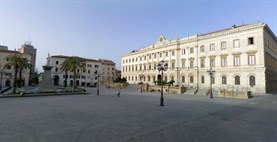Sassari
 Sassari is the capital city of the province of Sardinia of the same name and the second most populous city of the island. There is no certainty about the origins of the name, which probably derived from the ancient Sardinian language. The capital of the last independent principality of the island, the Giudicato d’Arborea, was finally subjected to the Aragonese Alfonso V the Magnanimous towards the middle of the fifteenth century. In the fourteenth century, Sassari had rebelled against the Aragonese, being pacified only with the advent of Alfonso V the Magnanimous. After the revolt the Aragonese built the castle of Sassari, which was also the seat of the Spanish Inquisition and was demolished in 1877. During the Early Modern period, the city was often the target of attacks by French ships (1527-1528) and pirates. The population was also decimated by the outbreak of the plague in 1582. There was always competition between Sassari (the capital of the Capo di sopra) and Cagliari (the capital of the Capo di sotto) for supremacy over the island. From the cultural point of view, Sassari enjoyed a heyday in the sixteenth century, and in 1562 the Jesuits instituted a studio generale that would lead, in 1617, to the founding of the first university in Sardinia. Entering into a full crisis during the last phase of the Spanish Government, Sassari, as the whole island, passed in 1713 to Austrian rule, and then in 1720 became part of the Kingdom of Savoy. (Photo: Piazza Italia Vecchia, Sassari).
Sassari is the capital city of the province of Sardinia of the same name and the second most populous city of the island. There is no certainty about the origins of the name, which probably derived from the ancient Sardinian language. The capital of the last independent principality of the island, the Giudicato d’Arborea, was finally subjected to the Aragonese Alfonso V the Magnanimous towards the middle of the fifteenth century. In the fourteenth century, Sassari had rebelled against the Aragonese, being pacified only with the advent of Alfonso V the Magnanimous. After the revolt the Aragonese built the castle of Sassari, which was also the seat of the Spanish Inquisition and was demolished in 1877. During the Early Modern period, the city was often the target of attacks by French ships (1527-1528) and pirates. The population was also decimated by the outbreak of the plague in 1582. There was always competition between Sassari (the capital of the Capo di sopra) and Cagliari (the capital of the Capo di sotto) for supremacy over the island. From the cultural point of view, Sassari enjoyed a heyday in the sixteenth century, and in 1562 the Jesuits instituted a studio generale that would lead, in 1617, to the founding of the first university in Sardinia. Entering into a full crisis during the last phase of the Spanish Government, Sassari, as the whole island, passed in 1713 to Austrian rule, and then in 1720 became part of the Kingdom of Savoy. (Photo: Piazza Italia Vecchia, Sassari).
